
 i_need_contribute
i_need_contribute
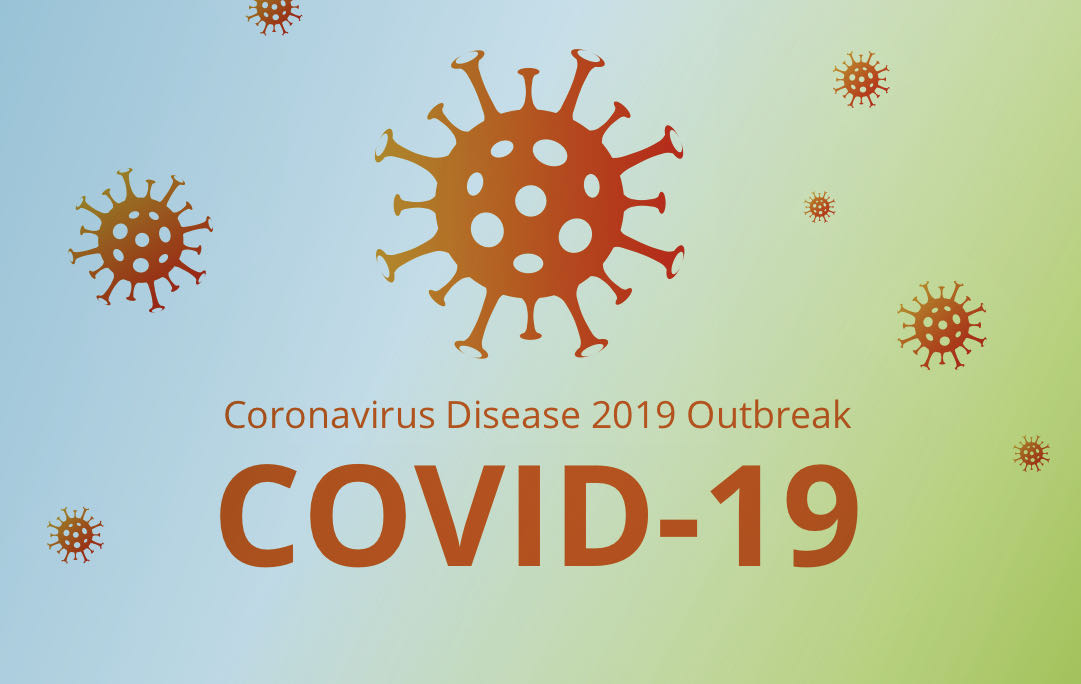
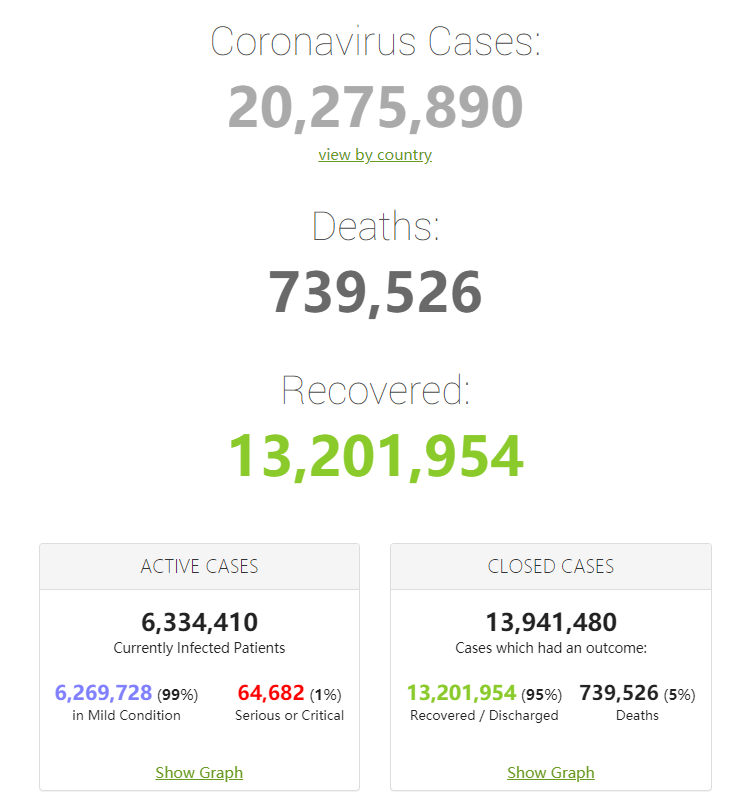
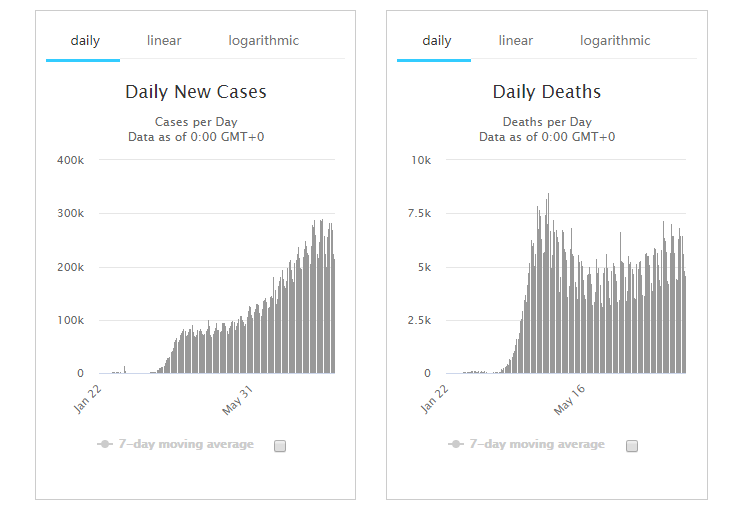
|
# |
Country, |
Total |
New |
Total |
|
|
World |
20,245,425 |
+216,302 |
738,303 |
|
1 |
5,251,446 |
+49,800 |
166,192 |
|
|
2 |
3,057,470 |
+21,888 |
101,857 |
|
|
3 |
2,267,153 |
+53,016 |
45,353 |
|
|
4 |
892,654 |
+5,118 |
15,001 |
|
|
5 |
563,598 |
+3,739 |
10,621 |
|
|
6 |
483,133 |
+5,109 |
21,276 |
|
|
7 |
480,278 |
+4,376 |
52,298 |
|
|
8 |
397,623 |
+10,142 |
13,154 |
|
|
9 |
375,044 |
+1,988 |
10,139 |
|
|
10 |
370,060 |
+2,873 |
28,576 |
|
|
11 |
328,844 |
+2,132 |
18,616 |
|
|
12 |
311,641 |
+816 |
46,526 |
|
|
13 |
289,947 |
+1,257 |
3,199 |
|
|
14 |
284,660 |
+539 |
6,097 |
|
|
15 |
260,507 |
+2,907 |
3,438 |
|
|
16 |
253,868 |
+7,369 |
4,764 |
|
|
17 |
250,825 |
+259 |
35,209 |
|
|
18 |
241,997 |
+1,193 |
5,858 |
|
|
19 |
218,500 |
+1,219 |
9,265 |
|
|
20 |
202,775 |
+785 |
30,340 |
|
|
21 |
153,599 |
+3,484 |
5,464 |
|
|
22 |
136,551 |
+6,871 |
2,293 |
|
|
23 |
127,083 |
+1,687 |
5,765 |
|
|
24 |
120,132 |
+681 |
8,987 |
|
|
25 |
113,262 |
+315 |
188 |
|
|
26 |
99,442 |
+741 |
1,246 |
|
|
27 |
95,666 |
+174 |
5,035 |
|
|
28 |
94,701 |
+242 |
5,932 |
|
|
29 |
89,999 |
+944 |
3,640 |
|
|
30 |
84,722 |
+1,720 |
613 |
|
|
31 |
84,668 |
+49 |
4,634 |
|
|
32 |
82,972 |
|
5,766 |
|
|
33 |
81,957 |
+1,008 |
1,922 |
|
|
34 |
81,787 |
+207 |
521 |
|
|
35 |
80,499 |
+767 |
1,328 |
|
|
36 |
75,394 |
+902 |
1,664 |
|
|
37 |
74,152 |
+751 |
9,872 |
|
|
38 |
72,400 |
+687 |
482 |
|
|
39 |
68,947 |
+97 |
589 |
|
|
40 |
62,704 |
+179 |
357 |
|
|
41 |
62,547 |
+779 |
2,729 |
|
|
42 |
59,194 |
+630 |
6,157 |
|
|
43 |
56,987 |
+382 |
2,222 |
|
|
44 |
55,292 |
+188 |
27 |
|
|
45 |
52,825 |
+157 |
1,759 |
|
|
46 |
52,410 |
+619 |
1,809 |
|
|
47 |
47,990 |
+1,207 |
1,047 |
|
|
48 |
47,454 |
+481 |
1,495 |
|
|
49 |
46,867 |
+290 |
950 |
|
|
50 |
44,397 |
+386 |
163 |
|
|
51 |
41,212 |
+209 |
215 |
|
|
52 |
40,433 |
+23 |
796 |
|
|
53 |
40,177 |
+258 |
1,474 |
|
|
54 |
37,162 |
+108 |
1,328 |
|
|
55 |
36,708 |
+105 |
1,987 |
|
|
56 |
35,712 |
+498 |
1,312 |
|
|
57 |
34,063 |
+826 |
516 |
|
|
58 |
33,647 |
+79 |
492 |
|
|
59 |
31,304 |
+695 |
200 |
|
|
60 |
28,262 |
+163 |
646 |
|
|
61 |
27,841 |
+181 |
850 |
|
|
62 |
26,928 |
+492 |
423 |
|
|
63 |
26,800 |
+995 |
229 |
|
|
64 |
26,768 |
+56 |
1,772 |
|
|
65 |
23,872 |
+586 |
244 |
|
|
66 |
23,591 |
+773 |
420 |
|
|
67 |
23,310 |
+338 |
79 |
|
|
68 |
22,106 |
+73 |
723 |
|
|
69 |
21,397 |
+313 |
313 |
|
|
70 |
20,872 |
+449 |
563 |
|
|
71 |
18,494 |
+141 |
390 |
|
|
72 |
18,042 |
|
395 |
|
|
73 |
16,798 |
+83 |
105 |
|
|
74 |
14,815 |
+373 |
620 |
|
|
75 |
14,626 |
+28 |
305 |
|
|
76 |
14,510 |
+302 |
100 |
|
|
77 |
14,498 |
+811 |
425 |
|
|
78 |
13,512 |
+116 |
459 |
|
|
79 |
13,202 |
+116 |
151 |
|
|
80 |
11,956 |
|
781 |
Source:https://www.worldometers.info/coronavirus/
From CNN's Zahra Ullah in Moscow
Russia has officially registered a coronavirus vaccine developed by the Moscow-based Gamaleya Institute, President Vladimir Putin said on Russian state TV on Tuesday.
Speaking in a live teleconference with his cabinet ministers, Putin said the vaccine had gone through all the necessary checks.
"A vaccine against coronavirus has been registered for the first time in the world this morning," Putin said, adding: "I know that it works quite effectively, it forms a stable immunity."
"So we're the first to have registered. I hope our foreign colleagues' work will move as well, and a lot of products will appear on an international market that could be used," Putin said.
The Russian President revealed that one of his daughters has taken the vaccine; he said she had a slightly higher temperature following the injections, but that she now feels better.
"I know this very well too, as one of my daughters has been inoculated with the vaccine," he said.
"I think that this way she participated in the experiment. After the first injection her temperature was 38 [degrees Celsius], the next day 37-something and that's it. After the second injection the temperature also got a bit higher but that's it, then it went back down. Now she feels well."
Reports about Russia's vaccine have come amid concerns about its safety, effectiveness and allegations that the country has cut essential corners in its development.
Russian officials told CNN previously that crucial Phase III trials would take place after state registration of the vaccine.
Russia has released no scientific data on its vaccine testing and CNN is unable to verify its claimed safety or effectiveness.
Critics say the country's push for a vaccine comes amid political pressure from the Kremlin, which is keen to portray Russia as a global scientific force.
From CNN's Marianna Cerini
Bars and restaurants around the world are having to rethink the way they interact with customers during the pandemic. In the Italian city of Florence, some are looking to the past: using centuries-old wine windows to dole out food and drinks.
Rising just above ground level, blink and you might miss these tiny openings, called "buchette del vino," (literally "little wine holes") in Italian. The small windows were used to sell wine-to-go during the Renaissance period, and were intended to be cheaper, direct-to-consumer alternatives to taverns and other drinking dens -- not to mention a discreet way for merchants to avoid paying taxes on the alcoholic libations they were peddling.
Those merchants were Florence's elites, many of whom had the foot-tall windows built into street-facing walls of their palatial residences, usually next to the main entrance. Back in the 1500s, a number of the city's aristocrats were also major wine producers in the surrounding countryside. The "buchette" allowed them to trade (or rather, have servants do it for them) their spirits straight from their in-house cellars to basically anyone, with a reduced need for physical contact.
In May, as Italy eased its two-months-long lockdown, several F&B businesses in Florence, who happened to be based in premises with existing buchette, decided to reopen them, capitalizing on the design's minimal-contact aspect. Wine, Aperol spritzes, ice creams and sandwiches have since been served through the holes, at a safe distance.
From CNN's Christina Maxouris
As US leaders work to control the spread of coronavirus, researchers across the country -- and globe -- are working to answer the mysteries that remain around infections.
One of those mysteries: why the experience can be so vastly different from person to person. One expert says the answer may mean taking a closer look at previous vaccines individuals have had.
"When we looked in the setting of Covid disease, we found that people who had prior vaccinations with a variety of vaccines -- for pneumococcus, influenza, hepatitis and others -- appeared to have a lower risk of getting Covid disease," Dr. Andrew Badley, an infectious disease specialist at Mayo Clinic told CNN's Anderson Cooper Monday night.
It's what immunologists call immune training: how your immune system creates an effective response to fight off infections, Badley says.
"A good analogy is to think of your immune system as being a muscle," he said. "The more you exercise that muscle, the stronger it will be when you need it."
There's been no definitive evidence of any other vaccines boosting immunity against Covid-19. But some researchers have suggested it's possible.
At least 5,094,400 coronavirus cases and 163,463 virus-related deaths have been identified in the United States since the pandemic began, according to Johns Hopkins University.
On Monday, Johns Hopkins reported 49,536 new cases of Covid-19 and 525 reported deaths.
The figures include cases from all 50 states, the District of Columbia and other US territories, as well as repatriated cases.
From CNN's Priscilla Alvarez
A US Customs and Border Protection officer speaks to people as they cross the border from Mexicali, Mexico, to Calexico, California, on July 22. Gregory Bull/AP
The Trump administration is considering ways to restrict entry on the US-Mexico border that could include US citizens and lawful permanent residents over coronavirus concerns, according to a source familiar with the matter.
It's the latest attempt by the administration to seal off US borders, citing the virus. In March, the administration invoked a public health law to swiftly remove migrants, including children, who are apprehended at the border. That action, including a series of other travel restrictions, has been extended over the course of the pandemic.
The options being weighed by the administration would also likely rely on authorities from the US Centers for Disease Control and Prevention, the source said. The New York Times first reported on the possibility of barring Americans from returning to the US on a limited basis amid fears they may be infected with the coronavirus.
"Career professionals at the CDC are working on an overall approach to pandemic control both now and in the future," an administration official with knowledge of ongoing discussions told CNN. "The regulation is in draft form and subject (to) change. This is an ongoing process and any reporting on this would be extremely premature."
CNN reached out to the CDC and the Department of Homeland Security, which declined to comment.
A draft memo obtained by the Times says any move to block citizens and legal permanent residents must "include appropriate protections to ensure that no Constitutional rights are infringed" and would apply "only in the rarest of circumstances."
From CNN's Angus Watson in Sydney
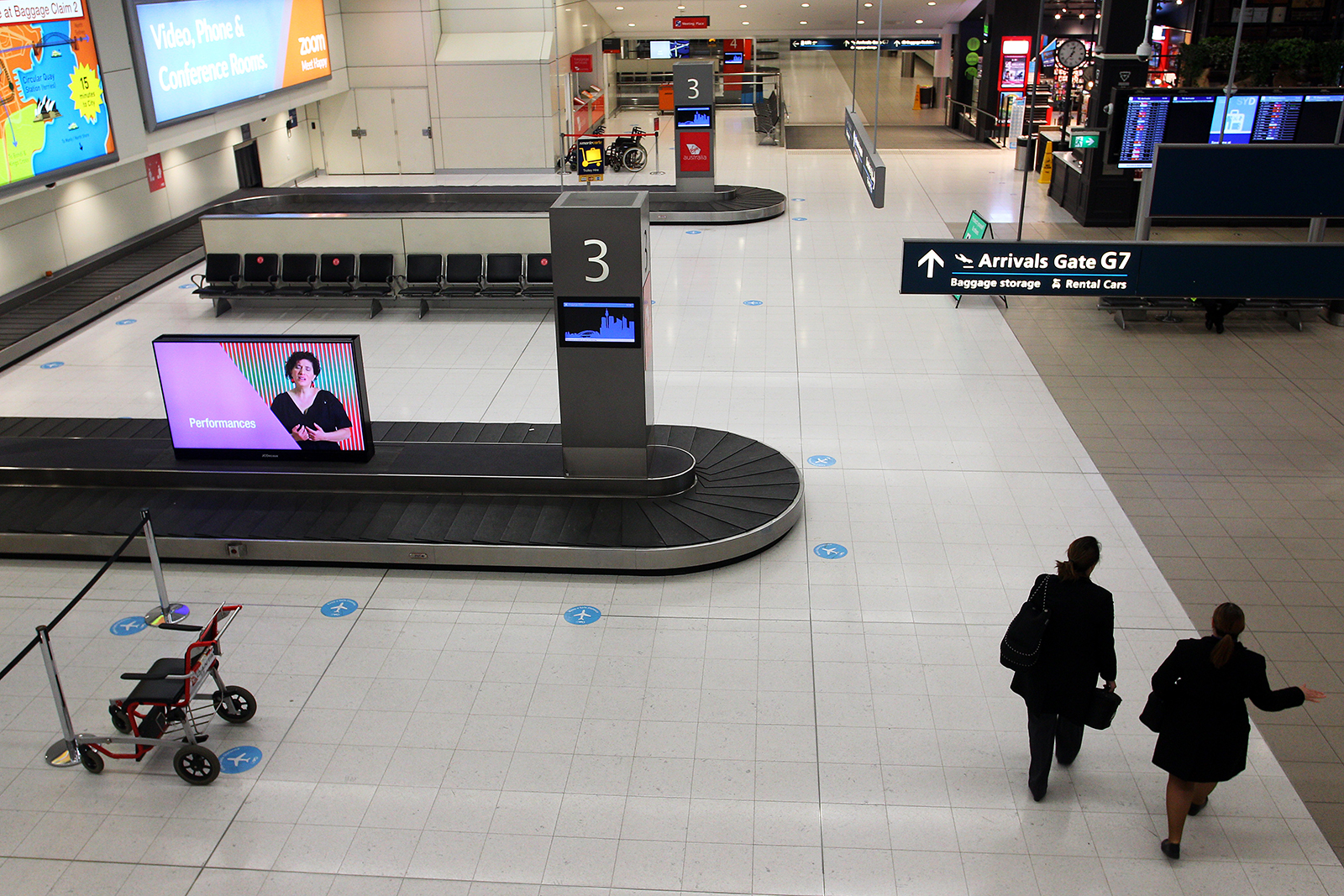
Airline staff walk past empty baggage carousels at the Sydney Domestic Airport Terminal arrivals area on August 7 in Sydney. Lisa Maree Williams/Getty Images
Australia’s states and territories will remain closed off from one another in the coming days, state and federal leaders said, as authorities continue to try to stop the latest wave of coronavirus cases in the country.
The state of Victoria, where Melbourne is located, has been dealing with a major upswing in cases in recent weeks. Authorities in Victoria identified 321 new Covid-19 cases Monday and 19 deaths.
New South Wales detected 22 new cases on Monday -- the highest in a single day since April.
Prime Minister Scott Morrison said Monday that “it's unlikely that we were able to move back to a restriction-free society” by Christmas.
“I doubt that is going to happen. I doubt the medical position will enable that. And so you've just got to follow the medical evidence on all of these, whether it's borders or whether it's the restrictions on trade or of local businesses or whatever it happens to be," Morrison said.
Here are some of the regional policies:
Victoria remains closed to all of Australia’s states and territories.
Northern Territory Chief Minister Michael Gunner said Tuesday that he plans for an 18-month border closure between his region and anywhere considered a hotspot -- including Australia's two largest cities, Melbourne and Sydney.
“Cancel your Christmas holiday plans, stay here in the Northern Territory," Gunner said in an interview with public broadcaster ABC on Tuesday. “We’re working towards an 18-month-window from today, towards the end of next year, is how we’re starting to resource our borders. We’re recruiting extra police. We’re making sure we keep those hard border controls in place.”
Western Australia and Tasmania remain closed to people from all other states.
Queensland and South Australia are closed to residents of Victoria and are quarantining anyone traveling in from New South Wales.
The Australian Capital Territory requires anyone traveling to the capital from Sydney or the state of Victoria to undergo a quarantine upon arrival.
From CNN's Yoko Wakatsuki in Tokyo
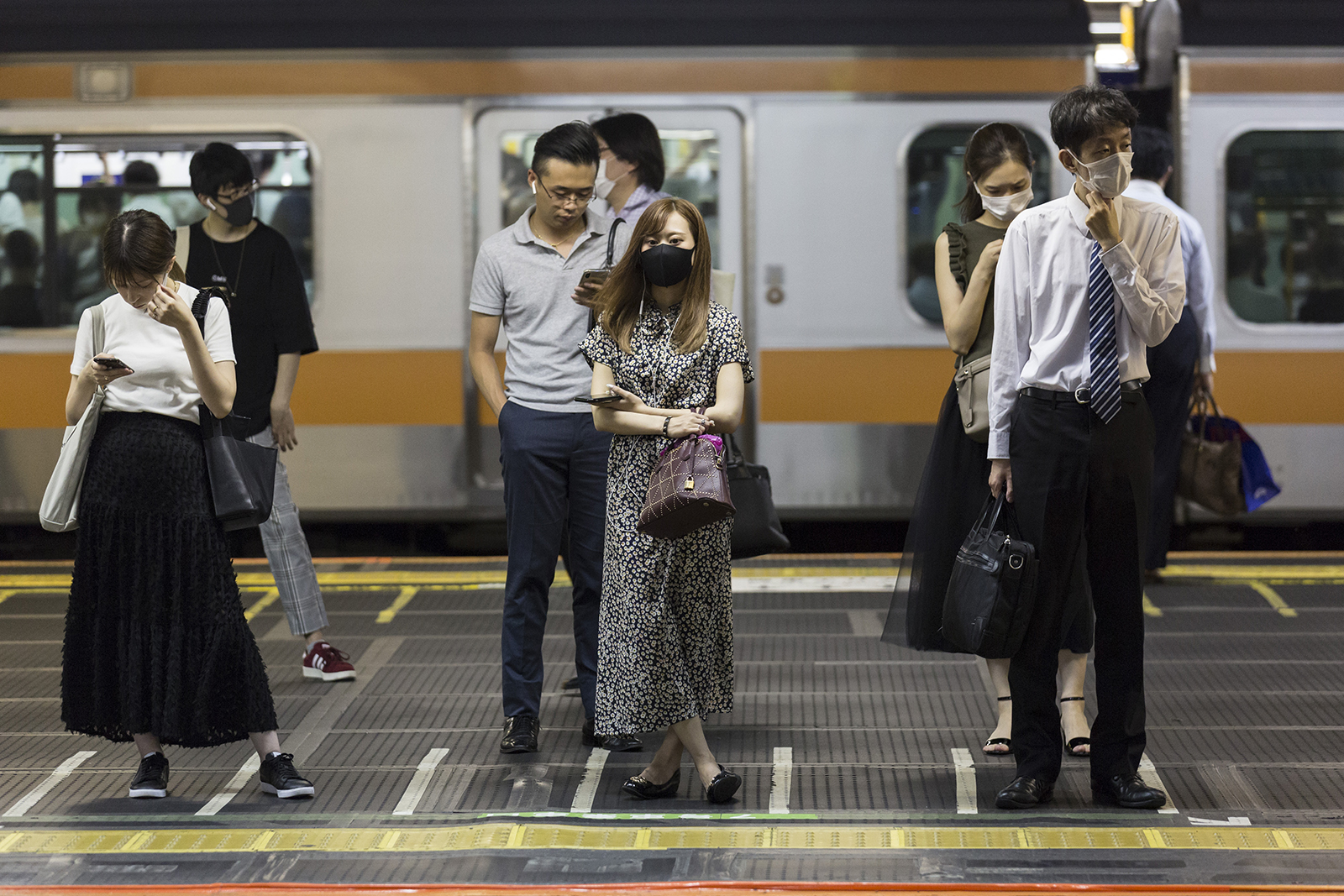
People wait for a train at Shinjuku station on August 4 in Tokyo. Yuichi Yamazaki/Getty Images
The Japanese Ministry of Health said 842 new cases of Covid-19 were identified on Monday, the first time in 13 days that the number of infections reported in a day dropped below quadruple digits.
Positive signs also emerged in Tokyo, where many of the new cases have been recorded. The Japanese capital recorded 196 infections Monday, the first time the daily case count there has dropped below 200 in two weeks.
Five coronavirus-related deaths were reported throughout the country on Monday, authorities said.
To date, 49,630 cases of the virus have been identified in Japan and at least 1,065 people have died.
An important caveat: Economic Minister Yasunori Nishimura, who is in charge of the nation's coronavirus policies, said in a news conference on Tuesday that the drop in cases could be due to the fact that fewer tests were conducted over a holiday weekend.
Nishimura called for continued vigilance and asked citizens to abide by safety measures in their daily lives, as the recent infections have been taking place more in offices, schools and during social activities.
Source:https://edition.cnn.com/world/live-news/coronavirus-pandemic-08-11-20-intl/index.html
Charlotte Graham-McLay
Jacinda Ardern, New Zealand’s prime minister, says “many questions remain” about the four new cases of Covid-19 diagnosed in the community — after 102 days of no such cases in the country.
She has announced that as of 12pm on Wednesday, Auckland, New Zealand’s largest city, will be placed in a restrictive phase of lockdown for three days.
Ardern said the most important thing was “tracing this case back to its original origin.”
“We have not been able to determine the source of these cases,” she told reporters in a late night news conference, of the four new cases.
Those diagnosed had no known link to the managed isolation facilities for returning travelers, nor to the country’s borders, where all recorded cases of the virus have been registered.
All schools and childcare facilities will be closed in Auckland from tomorrow, except for classes for the children of essential workers.
Official figures show employment in the UK fell by the largest amount in over a decade between May and July.
Employment decreased by 220,000 on the quarter, according to data from the Office for National Statistics.
This was the largest quarterly decrease since May to July 2009, it added. Unemployment has not surged as much as feared, because large numbers of firms have put employees on the government-backed furlough scheme.
Economists warn the full effect on employment will not be felt until the scheme ends in October.
For more information, follow the UK liveblog.
Nearly five months to the day since the World Health Organization declared a global pandemic, Covid-19 infections have passed 20m cases. In acknowledging the milestone, the health body’s chief warned against despair, saying if the virus could be suppressed effectively, “we can safely open up societies”.
Global cases reached 1m at the start of April. By 22 May, there were 5m cases. That figure had doubled to 10m cases by the end of June, and, seven weeks later, it had doubled again to 20m infections.
The WHO’s chief, Tedros Adhanom Ghebreyesus, has said he thinks despite the “great deal of pain and suffering” and the growing numbers, “there are green shoots of hope and … it’s never too late to turn the outbreak around”.
Tedros gave examples of countries that had successfully clamped down on the spread of Covid-19, citing New Zealand and Rwanda, and praised nations that had suffered major national outbreaks and were now responding quickly to local spikes:
Here are the key developments from the last few hours:
· Covid-19 infections have passed 20 million cases. In acknowledging the milestone, the health body’s chief warned against despair, saying if the virus could be suppressed effectively, “we can safely open up societies”.
· The Trump administration is reportedly considering a measure to block US citizens and permanent residents from returning home if they are suspected of being infected with coronavirus. A senior US official told Reuters that draft regulation, which has not been finalised and could change, would give the government authorisation to block individuals who could “reasonably” be believed to have contracted Covid-19 or other diseases.
· Singapore’s virus-hammered economy shrank almost 43% in the second quarter, in a sign that the country’s first recession in more than a decade was deeper than initially estimated, official data showed on Tuesday, AFP reports, as it warned of a “true resurgence” or “risk of further escalation of Covid-19” in several countries.
· Concern is growing that a resurgence of coronavirus in Europe will lead to a “second wave” of uncoordinated border restrictions. In a letter, the European commission warns that “while we must ensure that the EU is ready for possible resurgences of Covid-19 cases … we should at the same time avoid a second wave of uncoordinated actions at the internal borders of the EU”.
· Greece is “formally” in the midst of a second wave of the coronavirus pandemic, one of the country’s top infectious disease experts said, adding: “We can say that Greece has formally entered a second wave of the epidemic. This is the point that we could win or lose the battle.”
· Wearing a face mask became compulsory on dozens of busy Paris shopping streets and in other popular parts of the city from 8am on Monday as coronavirus numbers continued to rise in and around the French capital.
· Authorities in Iran shut down a newspaper after it published remarks by an expert who cast doubt on official coronavirus figures, claiming they only account for 5% of the real toll. Meanwhile, 189 more people died from Covid-19 and 2,132 more people had tested positive for the virus in the past 24 hours, the country’s health ministry said.
· There is a huge gap between funds needed to fight the coronavirus and funds committed worldwide, the World Health Organization chief, Tedros Adhanom Ghebreyesus, has said. Tedros said that ACT accelerator, an initiative established to develop and distribute tools to counter the spread of the pandemic, had received just one-tenth of the funding it needed.